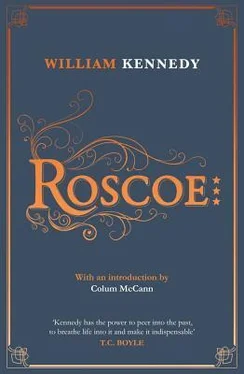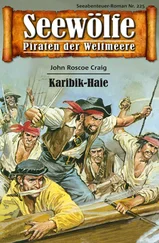“What do you think, Roscoe,” Patsy said as they stepped along, “are we going to win?”
“I’ve got a bet on it,” said Roscoe.
“You could be the new district attorney. Why the hell didn’t you run?”
“Public office isn’t what I’m after.”
“It’s not public office, it’s politics.”
“I don’t want to go like Felix.”
“He had a good run of it. He built some schools, he made his fortune.”
“He never got over the disgrace. I can’t live that way.”
“What the hell do you mean? You don’t want to stay with us?”
“I’m with you. I’ll just stay out of the limelight.”
“The only way around McCabe is to get elected.”
“I know, and you’ll do that,” Roscoe said.
“I might. We did the work. I think they’re with me.”
Patsy kept waving, calling dozens by name, passing out smiles. Men stepped out to shake his hand, women to kiss his cheek. “Patsy, Patsy, Patsy,” came the chant. We’d heard the same at football games when Patsy ran and passed but mostly bulled through center, the dominant strategy that kept the Spartans undefeated for eight years. Patsy, bored with winning, quit the team and it disbanded. Roscoe saw that same athletic energy in the man now as he marched, shaping the military-hero image he would abandon as soon as the parade ended, a public man with less love for the limelight than Roscoe, yet driving himself into it and beyond to beat those sonsabitches. Why?
At the Farmers’ Market, Townsend Blair made his final campaign speech to what was supposed to be a block party. But rain clouds opened and he only managed to say, “Our plurality over Mayor Watt will exceed our wildest predictions. Our information now makes it a sure three thousand.” As he said this, someone hit him with a potato and his fedora fell off. His optimism drowned in laughter and a cloudburst as the crowd ran for shelter without the villain’s being caught. The next day, in the Albany Argus, Willie Ryan, the fruit-and-vegetable dealer, took an ad to say, “I didn’t know who threw the potato but I know where he bought it.”
The Second Movement
The Argus reported on election morning that Republicans were spreading the word not to vote for Abner Straney, the incumbent assessor. Voters were confused as to why his own Party would cut Straney, and so was Straney. Republican bosses said it wasn’t true they were cutting him.
Roscoe and Patsy were not confused. As Blair’s popularity soared and Republicans foresaw the loss of City Hall for the first time in twenty years, Patsy had an idea: Tell Billy Barnes, the Republican boss, if he cuts Straney, we’ll cut Blair in the three wards where our troops are in place. We can probably guarantee a cut of eight hundred in just the Ninth Ward.
Roscoe took the plan to lunch with Edgar Wills, Billy Barnes’s lawyer, and after lunch the word came back: Done. The Straney rumor was on the street in every ward as soon as the polls opened, and the cut-Blair advisory ran wild among Democrats in select wards.
The Third Movement
Just as the polls were closing on election evening, in the front of Joey Corelli’s barbershop on Broadway, which was the polling place of the third district of the Ninth Ward, Fortune Micelli turned up with twelve Italian veterans who wanted to vote. They all roomed in the ward, in Micelli’s rooming house on Broadway, which had six cots and sixty-two registered voters. The vets had U.S. Army honorable discharges in hand, but no naturalization papers, and spoke little English. Micelli, a high-school classmate of Roscoe’s, demanded that these war heroes, who had risked their lives for America, be allowed to vote, but Republicans argued it was illegal; and bilingual shouting and pushing turned into a rolling battle of ethnic pride, patriotism, and bigotry. Roscoe interpreted their constitutional rights for the pushing and screaming Italians, but he agreed with the Republicans that they couldn’t vote and had to move their chaos out of the polling place and into the street, that the voting day was now at an end. And while workers of both parties and the volunteer poll-watchers formed a human blockade to prevent the Italians from assaulting the polls, the barbershop door was locked. Inside, Eddie Pfister, a plumbing-supply salesman who worked the voting table for the Republicans, and Bart Merrigan, his Democratic counterpart, alone at the table, unlocked the ballot box and quickly separated out all ballots marked for Straney. They drew an “x” next to Patsy’s name on each ballot, thus invalidating it with a second vote, then put all ballots back in the box and locked it.
Patsy carried the ward, 1,196 to 458, and defeated Straney city-wide for the assessorship by 145 votes. Straney demanded a police probe of Ninth Ward vote tampering, but it was denied.
Townsend Blair carried ten of the city’s nineteen wards but lost the Ninth Ward to Mayor Watt by 850 votes, and lost the election by 1,200 votes. Three days after the election, Blair, meeting with newspapermen immediately following the recount that he and Straney had demanded, spoke aloud for the first time the loser’s lament he would repeat for the rest of his life: “They counted me out. They counted me out.”
Getting Wet
On the night of the recount, Patsy’s victory party in the Malley brothers’ Beaver Street saloon, the largest in town, was a mob scene, easily three hundred on hand to celebrate the election. All saloons in the state, Malley’s included, had closed October 28, after the Senate passed the Volstead Act over President Wilson’s veto, but this was a private party and no one would be dry tonight, everything free, the Stanwix kegs, courtesy of Roscoe, stacked in the Malleys’ back room, the last beer made before the brewery went dark. Giving beer away was as illegal as selling it, but Roscoe had Bart check with the federal enforcers, and they would not be enforcing tonight. Too soon.
Roscoe saw Patsy, surrounded by neighbors, ward pols, and women who touched him when they smiled up into his face. “Oh, Patsy, they can’t stop you now,” this from Mabel Maloy, an Arbor Hill beauty who’d worked as a poll-watcher for him. Flora Pender beside her, a neighbor who’d had Patsy’s attention for years, plus three women Roscoe didn’t recognize, all found the new city assessor irresistible.
Roscoe intruded to ask Patsy, “How do you like your party?”
“Better than gettin’ hit with a potato.”
“Do you want to make a victory speech?”
“Didn’t you hear about the politician who made a speech and lost the election?”
“You won the election.”
“That’s because I didn’t make a speech.”
Roscoe saw Elisha in the crowd with Veronica, a permanent, walking glory, and he lost her and still can’t shed the pain after five years. He waved to Elisha, nodded hello to Veronica, and turned away. Craig Leland and Frank Rice were edging toward Patsy, a pair of young bankers who’d backed Townsend Blair and longed to break Barnes’s City Hall tie to old-line banks, and could Patsy be the way? He could, which gave this night an importance beyond the winning of a simple assessorship. People were starting to believe this was the hole in the dike and next would come the flood. Corbett Atterby, a young lawyer with a moneyed pedigree who’d soured on the Barnes machine and came to work for Patsy, stood at the hero’s elbow, exploring one of Patsy’s spillovers: an open-minded blonde who worked as a secretary in the law office of Patsy’s brother Matt, the reclusive lawyer whose firm would become the leading law group in the city in five years; and Matt was here with Liza, his beautiful wife nobody liked. Tim Wiley, whose Molders Union backed Patsy, was here, and there was Louie Glatz, assistant brewmaster at Stanwix, who took over after Felix’s longtime brewmaster, Franz Prediger, saw Prohibition coming and found work in Argentina.
Читать дальше












